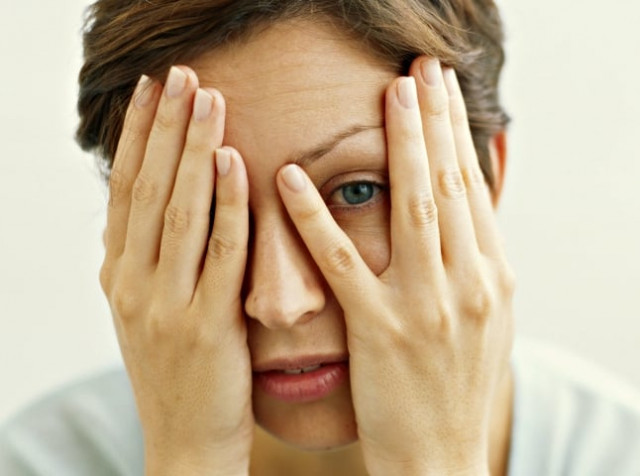10 signs you may have an anxiety disorder
Anxiety becomes so frequent or forceful that it begins to take over lives

PHOTO: HEALTH
How can you tell if your everyday anxiety has crossed the line into a disorder? Compiled from Health magazine, here is a list of signs that may indicate an anxiety disorder.
1. Excessive worry
The hallmark of generalized anxiety disorder (GAD)—the broadest type of anxiety—is worrying too much about everyday things, large and small. But what constitutes "too much"?
In the case of GAD, it means having persistent anxious thoughts on most days of the week, for six months. Also, the anxiety must be so bad that it interferes with daily life and is accompanied by noticeable symptoms, such as fatigue. "The distinction between an anxiety disorder and just having normal anxiety is whether your emotions are causing a lot of suffering and dysfunction," says Sally Winston, co-director of the Anxiety and Stress Disorder Institute of Maryland in Towson.
 PHOTO: WOMENS HEALTH
PHOTO: WOMENS HEALTH2. Sleep problems
Trouble falling asleep or staying asleep is associated with a wide range of health conditions, both physical and psychological. And, of course, it's not unusual to toss and turn with anticipation on the night before a big speech or job interview.
6 foods that reduce anxiety
But if you chronically find yourself lying awake, worried or agitated—about specific problems (like money), or nothing in particular—it might be a sign of an anxiety disorder. By some estimates, fully half of all people with GAD experience sleep problems. Another tip-off that anxiety might be involved? You wake up feeling wired, your mind is racing, and you're unable to calm yourself down.
3. Irrational fears
Some anxiety isn't generalised at all; on the contrary, it's attached to a specific situation or thing—like flying, animals, or crowds. If the fear becomes overwhelming, disruptive, and way out of proportion to the actual risk involved, it's a telltale sign of phobia, a type of anxiety disorder.
Although phobias can be crippling, they're not obvious at all times. In fact, they may not surface until you confront a specific situation and discover you're incapable of overcoming your fear. "A person who's afraid of snakes can go for years without having a problem," Winston says. "But then suddenly their kid wants to go camping, and they realize they need treatment."
 PHOTO: HEALTH MAG
PHOTO: HEALTH MAG4. Muscle tension
Near-constant muscle tension—whether it consists of clenching your jaw, balling your fists, or flexing muscles throughout your body—often accompanies anxiety disorders. This symptom can be so persistent and pervasive that people who have lived with it for a long time may stop noticing it after a while.
Regular exercise can help keep muscle tension under control, but the tension may flare up if an injury or other unforeseen event disrupts a person's workout habits, Winston says. "Suddenly they're a wreck, because they can't handle their anxiety in that way and now they're incredibly restless and irritable."
5. Chronic indigestion
Anxiety may start in the mind, but it often manifests itself in the body through physical symptoms, such as chronic digestive problems. Irritable bowel syndrome (IBS), a condition characterised by stomachaches, cramping, bloating, gas, constipation, and/or diarrhea, "is basically an anxiety in the digestive tract," Winston says.
7 belittling things we say to people suffering from anxiety
IBS isn't always related to anxiety, but the two often occur together and can make each other worse. The gut is very sensitive to psychological stress—and, vice versa, the physical and social discomfort of chronic digestive problems can make a person feel more anxious.
6. Stage fright
Most people get at least a few butterflies before addressing a group of people or otherwise being in the spotlight. But if the fear is so strong that no amount of coaching or practice will alleviate it, or if you spend a lot of time thinking and worrying about it, you may have a form of social anxiety disorder (also known as social phobia).
People with social anxiety tend to worry for days or weeks leading up to a particular event or situation. And if they do manage to go through with it, they tend to be deeply uncomfortable and may dwell on it for a long time afterward, wondering how they were judged.
 PHOTO: THE GUARDIAN
PHOTO: THE GUARDIAN7. Self-consciousness
Social anxiety disorder doesn't always involve speaking to a crowd or being the center of attention. In most cases, the anxiety is provoked by everyday situations such as making one-on-one conversation at a party, or eating and drinking in front of even a small number of people.
In these situations, people with social anxiety disorder tend to feel like all eyes are on them, and they often experience blushing, trembling, nausea, profuse sweating, or difficulty talking. These symptoms can be so disruptive that they make it hard to meet new people, maintain relationships, and advance at work or in school.
Anti-anxiety pills in Pakistan: Mama’s little helper
8. Panic
Panic attacks can be terrifying: Picture a sudden, gripping feeling of fear and helplessness that can last for several minutes, accompanied by scary physical symptoms such as breathing problems, a pounding or racing heart, tingling or numb hands, sweating, weakness or dizziness, chest pain, stomach pain, and feeling hot or cold.
Not everyone who has a panic attack has an anxiety disorder, but people who experience them repeatedly may be diagnosed with panic disorder.
9. Perfectionism
This is especially common in obsessive-compulsive disorder (OCD), which, like PTSD, has long been viewed as an anxiety disorder. "OCD can happen subtly, like in the case of somebody who can't get out of the house for three hours because their makeup has to be absolutely just right and they have to keep starting over," Winston says.
 PHOTO: ANXIETY RESEARCH
PHOTO: ANXIETY RESEARCH10. Self-doubt
Persistent self-doubt and second-guessing is a common feature of anxiety disorders, including generalized anxiety disorder and OCD. In some cases, the doubt may revolve around a question that's central to a person's identity, like "Do I love my husband as much as he loves me?"
Have something to add to the story? Share it in the comments below.



















COMMENTS
Comments are moderated and generally will be posted if they are on-topic and not abusive.
For more information, please see our Comments FAQ